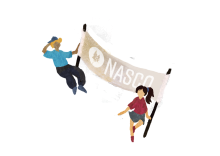NASCO Institute 2024 workshops are shown below, please note that times may be adjusted and a few workshops may be added as we confirm availability of presenters.
Course Block 1
Friday, November 15th, 3:45pm - 5:15pm
Cooperative Money Systems
Fuzzy Shostak
Many people think money is neutral—just a medium of exchange. But our money system is built on debt, it deepens inequality and competition, and it drives the destruction of the environment. In this workshop we will discuss some of the problems with the money system giving rise to the need for new kinds of money and payment. We will see how many communities are taking control of their economies with local currencies, timebanks, cryptocurrencies, and other systems. And we will present Common Good, an open source, cooperative digital currency and payment system you can start organizing in your community today.
Creating a New Co-op, Part 1: The Development Process
Mark Fick, Brel Hutton-Okpalaeke
This session is the first step on the co-op development track and provides an introduction and overview of the entire development process from initial ideas to buying your home. We will explore the common (and uncommon) ways to create a housing co-op, focusing on the initial steps: creating a collective vision, organizing your development team, and laying out the roadmap to success. Participants will leave the session with a basic understanding of the multiple layers of work involved in organizing the people, money, real estate and development partners. The session will include presented material, open discussion, and interactive activities.
Let's Create a Viable Co-op Member Exchange Program
Grant Mueller
What do we need to do in order to create a viable member exchange program between current NASCO/NP co-ops? How can partcipating co-ops provide needed financial and logistical support to make this happen? What do we want such a program to accomplish? This working group provides a opportunity for participants to contribute their ideas, network with each other, and develop commitments and a realistic plan to create a member exchange program that enables co-ops to host visiting members in order to facilitate the exchange of information and experience and build active relationships between them to strengthen the co-op movement in North America.
Mobilizing Housing Development For Youth Aging Out of Foster Care
Donna Coulter
During this session, Higher Ground Abodes will describe its efforts to develop housing with people extremely low-income Detroiters aging out of foster care who need housing, financial, and life support. The model combines community land trust (CLT) and group equity cooperative living to provide shared housing within the youth's financial reach. The presenter will outline the CLT's plans for co-managing its properties with occupants (also known as "Partners") and supporting Partner's efforts to matriculate in life. Partners gain a single CLT share, enabling them to have a private bedroom, vote in property management decisions, and monetary share of savings based on operating efficiencies.
Purpose Driven Governance Part 1 - Board Roles & Responsibility
Lana Wong
Purpose driven organizations need governance bodies that focus on the organizational purpose and big picture. How does a board of directors achieve its purpose without rubber stamping or meddling with day-to-day operations? In this session, we will cover the purpose of a board of directors, duties of individual board members, governance structure and ecosystem, and board cycles and processes. This is session part one of two purpose driven governance sessions, part two will build on foundations covered in this session.
Course block 2
Saturday, November 16th, 9:00am - 10:15am
Building Economic Democracy: Building Blocks for Co-op Strategy
Steve Dubb
How can co-ops not just serve member-owners, but act as the life-affirming institutions that we need to build a more democratic economy, rooted in values of solidarity? This session will introduce key strategies that can build wealth and power in communities —such as community land trusts, participatory budgeting, public banks, and employee ownership. In this participatory session, there will also be a chance for participants to meet in small groups and workshop strategies to develop some of the concepts and examples highlighted in the sessions into actions that can inform cooperative and solidarity economy ecosystem building in their home communities.
Community and Affordability: Innovations in the Community Housing Movement
Sarah Wells
Throughout the country, housing organizers and developers are coming together to reimagine and embrace forms of community housing that allow for everyday interaction while also preserving affordability. As we seek to become a more inclusive movement, affordability is a top strategy for achieving all kinds of diversity. This session will showcase different types of shared housing models, explore adaptive re-use as a community housing strategy, educate about opportunities and workarounds in building and zoning codes, and identify opportunities in the current market for acquiring and developing property for community use. This session is ideal for folks interested in community cooperatives or in creating their own communities after moving on from student co-ops. Join us in thinking outside the box to create more inclusive and affordable spaces for all!
Creating a New Co-op, Part 2: Strategies for New Co-op Organizers
Mark Fick, Maggie O'Connor
A successful housing cooperative needs the support and participation of a community of people, but it takes individual effort to organize that support and participation. In this workshop, we'll explore community organizing strategies to get new co-ops up and running and the skills you need to effectively deploy these strategies. We'll focus on building a shared vision, a committed team, and a network of support. This workshop is designed for people currently or planning to be involved in starting a new co-op.
From Co-op to Community
Daniel Greenberg
Do you love living in community and want to make it part of your life post-college? Come learn about the Foundation for Intentional Communityn (www.ic.org), the Global Ecovillage Network (www.ecovillage.org) and other opportunities to stay connected to the growing movement of communities striving to model positive visions for humanity and the planet.
Mental Health Crisis in Housing Cooperatives: A Consent and Context-Based Approach
James Gleespen
Mental health crises are common in housing cooperatives, but it can be difficult to know how to respond. In addition, traditional teachings about how to respond to crises can conflict with principles we value, like consent, and can perpetuate oppressive harm. In this session, you’ll learn how to respond to mental health crises in your co-op in a way that prioritizes consent and protects the autonomy of the individual in crisis. You’ll also learn about creating a positive and prepared culture surrounding mental health in your co-op.
More Co-ops! Building a Real Alternative to Tenancy and Homeownership
William Lawrence
Rental housing gets crappier and more expensive every year; homeownership is unappealing to some and unavailable to many. Housing cooperativism offers an alternative to being a renter, or a homeowner, but co-ops remain a miniscule share of the overall housing market. Most student members of NASCO co-ops end up as renters or homeowners for lack of viable cooperatives to be a part of once they graduate college and enter new stages of life. We should want there to be housing co-ops for every stage of life, from youth into parenting/middle age and finally old age. This clearly does not exist right now. What are the barriers to vastly expanding cooperativism as a real "third option" to tenancy or homeownership? What opportunities exist to move in that direction?
Navigating Conflict in Cooperatives - Part 1
Steve Vig
Where people live together in community conflict is inevitable, but we don’t have to let it tear our communities apart. Learn ways to resolve conflict constructively while minimizing harm to participants and the relationships between them. We will discuss types of conflict, the limits of conflict resolution, mindsets and practices that contribute to healthy conflict resolution, and various tools for resolving conflicts and when each is appropriate including nonviolent communication, mediation, restorative circles, and member review.
Purpose Driven Governance Part 2 - System Approach
Lana Wong
The Policy Governance model provides a framework to help boards focus on organizational long term vision and ensure accountability towards their membership. What is unique about Policy Governance that guides good governance? In this session, we will cover the theory of the model, its application and impact on the annual calendar at a co-op, and contrast with other governance practices. Attendees will reflect on governance practices at their co-op, and simulate common decisions using the Policy Governance model in this workshop. This session is part two of two purpose driven governance sessions.
Roundtable - Large Student Housing Co-ops
Facilitator: Cyn Macias-Gomez
Big co-ops face unique issues. Can we look to other big co-ops for help? This session is designed to create conversations between the leadership of larger cooperatives to address common challenges while also building a stronger cooperative network. Meet co-op leaders from around the country, learn about our peer organizations, and have conversations in which participants brainstorm problem-solving suggestions for their neighbors. We hope to start conversations - and build organizational relationships - that continue through both Institute and years to come.
Course block 3
Saturday, November 16th, 2:45pm - 4:00pm
Panel: Cooperatives as Tools for Social Transformation
Moderator: Steve Dubb
Panelists:
- Karen Tyler-Ruiz - Executive Director, Center for Community-Based Enterprise, Detroit, MI
- Lanay Gilbert-Williams - Board President, People's Food Co-op, Detroit, MI
- Bronwyn Walls - Solidaire (and former NASCO staff), New Orleans, LA
- Sarah Wells - Queen City Cooperative, Denver, CO
- Elise Fernandez - Director of Property Services, NASCO, Miami, FL
How can we apply cooperative principles and build links of cooperation beyond the confines of our own co-ops? This moderated panel of co-op activists brings together people who have used their work in co-ops to build alliances with broader social movements and advance community-led social change. Come and learn more about a wide range of methods for building a democratic economy (while displacing corporate capitalism at the same time!). Audience participation is encouraged, so please bring your best community building and community organizing questions with you.
The Cooperative Horizon: Collapsing the Housing Market - Part 1
Liz Curran-Groome, Caroline Davis
The housing market is not a free market. There’s a ton of free money out there and most of it subsidizes landlord profiteering. What if we the autonomous communities were to get in on the party? Bloomington comrades present a) the political framework of “building & fighting” which necessitates strategic expansion and mutual support for producing collective power and b) a toolkit for acquiring and financing cooperative housing properties with an anti-bureaucratic group-equity model. We end in breakout groups workshopping strategies members might employ in their cities. Together, let’s collapse the housing market.
Creating a New Co-op, Part 3: Incorporation and Bylaws
West Foster, Maggie O'Connor
Incorporation is the process of taking your idea of a co-op and making it into a legal entity that can own property, take out loans, and enter into contracts. But there are often many choices that can stymie a group's progress: Corporation or LLC? Which tax-exemptions do we want? We will discuss the why and how of incorporating a co-op, with particular attention to creating bylaws for new organizations.
Fair Housing Act and Your Co-op
Brian Donovan
Many co-ops don't think much about Fair Housing laws. There are some details of the Fair Housing Act that might conflict with some membership practices, though, and the punishments for violating the Fair Housing Act can be huge. We also all care deeply about social justice, and want to use our co-ops as a model for a better way to live, and most of us would never dream of committing housing discrimination. This workshop is meant to give an overview of what following the FHA might mean to your coop, as well as some things that all housing providers (including co-ops) must and cannot do.
How NASCO has inspired European Student Housing Cooperators
Anke Schwittay and Jim Jones
This workshop will introduce the Pan-European Student Cooperative Housing Network (PESCHA), which is an ecosystem of cooperatives in six European countries that aims to grow the number of student housing cooperatives. While some members (UK, Germany, Switzerland) have well-established coops, other members (Ireland, Hungary, Italy) are at the beginning of their coop journey. We will also present lessons from the success of UK housing coops, and show how NASCO has inspired European student cooperators. This will lead into an interactive exercise on what inspires workshop participations to undertake and persist with cooperative work.
Navigating Conflict in Cooperatives - Part 2
Steve Vig
Where people live together in community conflict is inevitable, but we don’t have to let it tear our communities apart. Learn ways to resolve conflict constructively while minimizing harm to participants and the relationships between them. We will discuss types of conflict, the limits of conflict resolution, mindsets and practices that contribute to healthy conflict resolution, and various tools for resolving conflicts and when each is appropriate including nonviolent communication, mediation, restorative circles, and member review.
When Boundaries Get Crossed: A Transformative Justice Approach to Consent Violations
Fuzzy Shostak and Emma Daley
Most co-ops strive to be places of care, community, and consensus, but even in co-ops, boundary crossings happen. How do we handle them in a way that prioritizes safety while treating everyone with fairness and respect? How can we create cultures where consent is so normal that major incidents are rare? We want to hear what happens in your co-ops, cross-pollinate ideas, and share our experience running non-punitive Consent Teams that provide communities with education, emotional support, and mediation. We've had incredible success addressing small incidents BEFORE they become big ones, and you can too!
Roundtable - Canadian Co-ops
Facilitators: Emily Sears, Rahul Mannapperuma
Canadian cooperatives operate within a distinct landscape, facing challenges related to governance, policy, and regional dynamics. This session will bring together members from cooperatives across Canada to discuss these unique issues, share experiences, and explore solutions that strengthen the cooperative network. We hope this session will spark ongoing discussions and partnerships that continue long after the Institute.
Course block 4
Sunday, November 17th, 9:30am - 11:00am
Co-op Leadership Part 1: Adaptive Work and the Peer Consultation Process
Katherine Jennings
In this session, participants will be introduced to NASCO’s cooperative leadership framework, exploring the difference between adaptive and technical work within co-ops. We will also learn about the peer consultation process and take time to individually brainstorm adaptive challenges present in our own co-ops. These challenges will form the basis of small group discussions in Part 2 of this workshop, where participants will have the opportunity to present and receive feedback from their peers. This session sets the foundation for understanding how adaptive leadership can help cooperatives tackle complex, non-technical problems.
Creating a New Co-op, Part 4: Budget and Feasibility
Mark Fick
Would you like to feel more empowered to understand and participate in housing co-op development projects? This workshop attempts to demystify the financial aspects of co-op development. Designed for those without much experience, attendees will gain higher levels of comprehension and reduce the feelings of confusion around their co-ops’ development and expansion initiatives. It’s applicable to those in established co-ops that might consider expanding as well as folks looking to start up a first house.
Creating Neurodiverse Conscious Communities: Recognize and Respect Members Strengths and Differences
Alex Bailey
This session will look at examples of how neurodiversity and unseen disabilities can affect participation and volunteer retention. We will explore ways to identify barriers to ongoing participation and how to approach accommodations with compassion and respect.
Acknowledging the diverse nature of human brain development is an important step to unlocking/tapping into everyone’s potential and finding ways to use individuals’ superpowers. Co-operatives rely on participation and can benefit from understanding neurodiversity, the challenges that come from our differences and the strengths everyone can bring to the group when given the right approach and tools.
Creating a New Co-op - Tax Exemption
West Foster, Brel Hutton-Okpalaeke
What does it mean to be a “nonprofit”? What are the benefits and drawbacks of 501c3 status and other tax exemptions for co-ops? Is it worth it? We will discuss the systems of nonprofit incorporation, federal tax exemption, and local tax exemptions. We will also cover the 501c3 application (IRS Form 1023) in detail.
Governing Big Coops Through Crisis
Bryan Pagán, Cyn Macias-Gomez
Both the ICC and BSC Recently Encountered Crises. The pandemic added fuel to the fire, but was not at the main issue at all. In 2022 the ICC fired its Finance Director and the General Manager resigned after being censured by the board. The BSC is on their third Executive Director in the last few years and has seen turnover in several important staff roles. The BSC faced conflicts among Management and Staff and between Management and the Board of Directors in recent years. Both Co-ops appear to be emerging from the crises at this time. As the current Board Presidents we want to share the role student members played and are playing in governing the organizations through these challenging times.
Organizing Across Movements
Camila Tapia-Guilliams
Cooperatives are organized by community members collectively meeting their needs as mutual aid. They are rooted in a diverse history across movements for people power. While community organizing is foundational to many cooperatives’ history and practice, it is often an unspoken tactic or framework. This session will share the qualities of an anti-oppressive organizer, how to have a basic organizing conversation, consider what we are organizing towards, and why organizing skills are key to the growth of the cooperative economy.
Utilizing Restorative Justice to Promote Diversity in Your Co-op
Lily Kapiloff, Lincoln Miller
Many of us seek to make cooperatives home to residents coming from diverse backgrounds. However, when people with a range of backgrounds, perspectives, education, and values come together to make sometimes high-stakes decisions by consensus about how to upkeep their home - there can be conflict. The Boulder Housing Coalition has spent the past 20 years designing and implementing a restorative approach to conflict that supports our residents in navigating these complex and intersectional conflicts. Join us to learn how to create a restorative system for your co-op!
Course block 5
Sunday, November 17th, 11:15am - 12:45pm
Co-op Leadership Part 2: Peer Consultations
Katherine Jennings
This hands-on session will dive straight into selecting challenges to present in small group peer consultations. Participants should attend Part 1 if they are unfamiliar with the peer consultation process. Through collaborative problem-solving, participants will give and receive feedback, offering strategic insights into real-world co-op challenges. Come prepared to actively engage in discussions and support your peers in addressing complex issues within their co-ops.
The Cooperative Horizon: Collapsing the Housing Market - Part 2
Liz Curran-Groome, Caroline Davis
The housing market is not a free market. There’s a ton of free money out there and most of it subsidizes landlord profiteering. What if we the autonomous communities were to get in on the party? Bloomington comrades present a) the political framework of “building & fighting” which necessitates strategic expansion and mutual support for producing collective power and b) a toolkit for acquiring and financing cooperative housing properties with an anti-bureaucratic group-equity model. We end in breakout groups workshopping strategies members might employ in their cities. Together, let’s collapse the housing market.
Creating a New Co-op, Part 5: Finding a Property that Fits Your Group’s Needs
Brel Hutton-Okpalaeke
Sure, you found the perfect house. But should you buy it, or even rent it, given your local zoning codes? And how does cost factor in, not to mention community? What you can buy or should buy may be very different from what you want to buy. Figuring out what to look for in advance will help to keep you from many a heartache! This workshop will look at the interactions between city requirements, cost, community-building, location, size, sources of funding, political support, and many other factors that influence the nature of the building you should be looking for.
Cultivating Connection: Principles to Support Facilitation - Part 1
Adrian Roman
Facilitation is an important skill in any cooperative. The practical skills are very important, as are the intuitive elements - like when someone may not have felt heard, or when things need to shift direction, how to adapt or allowing emergence. In this session we will experience a Listening Circle. A Listening Circle is an intentional space where we gather to build relation, connection, trust and practice being seen, heard, seeing and hearing. An agenda-less space. Yes, we will have prompts to guide our space, but there is no aim aside from being present with each other and seeing what emerges. We will also explore how experiencing and conducting spaces like this can inform and fortify our facilitation of more technical gatherings, like meetings.
Revitalizing Your New Member Acceptance Practices
Emily Sears, Rahul Mannapperuma
Updating your co-op's practices to align with your vision, mission and goals is no small feat. After a downward trend of engaged student members, Neill-Wycik decided to overhaul their membership acceptance from a "First Come, First Serve" policy to a rigorous, robust process to ensure the alignment of new co-op members with the co-op's mission and vision as best as possible. Come listen to how it was made possible, and meet other co-ops facing similar challenges.
So we have this conflict...
Annunziata Feldis
A session about generative conflict in the context of cooperative housing. The longevity of a co-op and of the tenure of its members necessitates conflict work. Anybody can skill up in their ability to hold conflict! This session is a popular education forum to explore our conflicts, our resources, and our boundaries. We'll think through different types of conflict together in a boundary-centered framework to help us assess, understand, support and resolve conflicts in our homes. There will be space for commiserating about the specificity of co-op life, exploration of somatic practices, discussion of resources.
The impact of Direct Federal Loans to Student Co-ops in the 60's-80's AND why we should lobby for more!
Brian Donovan, Jared Katzman
Brian will present research he did for CCDC about co-ops that received funding through the College Housing Loan Fund, what they used the funds for, and make the case for lobbying in DC when the new administration is getting started. We will discuss what we should request and sign up interested co-ops and members to make the trip in early 2025.
Course block 6
Sunday, November 17th, 2:00pm - 3:30pm
Once a Member, Always a Member: Nourishing Ongoing Relationships with Alumni
Elissa Roy, Ester Lee, Portia Lewis, Susan Caya, Syd Burke
Organizing alumni is a direct and effective way to mobilize the co-op movement. Learn about our co-ops & the alumni who love them! Does your co-op have alumni, and you’re unsure how to engage them? Whether serving as a professional network, a giving pool for fundraising, or as advisors for current Board & members, developing an alumni relations program can address numerous co-op goals while creating a more comprehensive co-op network to support Rochdale Principles. Our presenters will cover the fundamental steps to set up an alumni relations program based on their experiences in different contexts across the country and answer questions from attendees. You will leave our session with the confidence to discuss alumni relations at your co-op! Presenters will share some example materials, and you can always reach out to us afterward for advice on starting a program at your co-op. Attendees can consider some questions in advance to inform the conversation: What’s your “why” for having an alumni association? What benefits would this bring to your organization? Do you have a database to track alumni contact information? What events do you currently hold specifically for alumni relations? People who have lived in co-ops often spread the word about co-ops, create new ones, support improving existing co-ops, and spread the values of cooperation throughout the world. Join us!
Cooperative Cooking for Cooperative Houses
Steve Vig
Starting with The Eightfold Path to Cooperative Cooking, we’ll share tips on cooking for cooperative communities regarding issues such as scaling recipes, accommodating dietary restrictions, cooking and shopping on a budget, and the importance of desserts. We’ll begin with a list from the presenters, then use community knowledge to create a sharable list of co-op cooking tips that participants can bring home to their kitchens.
Creating a New Co-op, Part 6: Negotiating a Master Lease & Property Purchasing Clinic
Brel Hutton-Okpalaeke, Maggie O'Connor
Real estate transactions can be complicated, and for co-ops trying to purchase or lease property, there are unique considerations and obstacles. While purchasing a new property is one route for development, leasing can be a good option for a new co-op to build its business history, or for an existing co-op to explore expansion. Whether leasing or buying you will need to educate and negotiate to get the best terms for your co-op, as most lenders and landlords are unfamiliar with housing co-ops. In this session, we will work with participants one-on-one to examine their current or planned cooperative housing development projects and offer advice on how to navigate the real estate purchasing or leasing process.
Cultivating Connection: Principles to Support Facilitation - Part 2
Adrian Roman
Facilitation is an important skill in any cooperative. The practical skills are very important, as are the intuitive elements - like when someone may not have felt heard, or when things need to shift direction, how to adapt or allowing emergence. In this session we will experience a Listening Circle. A Listening Circle is an intentional space where we gather to build relation, connection, trust and practice being seen, heard, seeing and hearing. An agenda-less space. Yes, we will have prompts to guide our space, but there is no aim aside from being present with each other and seeing what emerges. We will also explore how experiencing and conducting spaces like this can inform and fortify our facilitation of more technical gatherings, like meetings.
Exploring Archives and Institutional Memory
Olivia Wohlgemuth, Maya Miller
What is the power in knowing our history? In this roundtable session, we will discuss the elements that make a co-op- or organizational-level archive successful. We will delve into the importance of capturing and sharing institutional memory, and think about potential structures and approaches for establishing and maintaining a community archive for our cooperative systems.
Next-Gen Cooperatives: Engaging Youth in Co-op Development
Erin Larmondin
How can we empower the next generation to lead the cooperative movement? This interactive workshop will explore strategies to engage young people in cooperative development and leadership, ensuring the future sustainability and growth of the co-op ecosystem. Participants will learn about successful youth-led co-ops, overcome common barriers to youth involvement, and brainstorm creative co-op ideas that address youth-specific needs such as housing, employment, and social justice. Attendees will also develop actionable plans for engaging youth in their own communities, using real-world examples and practical tools.
Storytelling Time!
Bronwyn Walls
In this workshop, we'll discuss how storytelling is a tool for social change and we'll explore a storytelling framework that connects our own personal narratives to the social change work that we are embedded within in our co-ops and beyond. We'll then work together to develop and refine our public narratives related to the power of cooperation. P.S. The stories we create in this workshop can be used for member recruitment, fundraising, grant writing, education, and more!
Understand Your Co-op Through Finances
Lana Wong
As the board of directors that is responsible for the well being of the co-op, you are often presented with financial reports. But what do they mean and how to they reflect the state of the co-op? How are they used as tools to plan for the future? This session will go over financial representation of current co-op state, co-op's operations, plan for future, and performance measurement.






